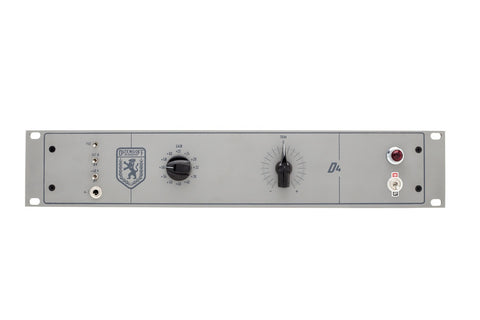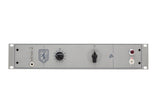The Dizengoff D4 is a tribute to a rare and much loved British tube console from the 1960’s. The original circuit was designed by the Recording Engineering Development Department as a replacement for the Siemens V72S amp cards used in an earlier British console. It featured three gain settings (+36, +40, and +46), and a ‘fine trim’ knob that allowed the user to trim gain by a few dB. The D4 has expanded that range from +20 up to +60 using a 12 step rotary attenuator. Like the original design, the D4 ‘trim’ control allows the user to fine tune the gain by 2-4dB depending upon the gain switch setting.
The sound is huge and open–heard on albums recorded by The Beatles, Pink Floyd, and The Zombies between 1964 and 1968. It has incredible detail, and the kind of wonderful coloration that only an EF86 pentode can deliver. It’s often considered to be the sound of John Lennon’s “Revolution,” which used two console channels in series to achieve an overdriven sound.
Signal path transformers are custom wound right here in Chicago. They’re based on the transformers used in the original, but they take advantage of modern materials. The input transformer is a hi-nickel (80% nickel content) and the output transformer is a lo-nickel (50% nickel) for excellent fidelity.
The power supply is internal. It’s built around a Japanese Nippo Steel R-core power transformer. It has extremely high efficiency and low noise compared with traditional E-I core transformers and plays a significant part in achieving the D4’s low noise performance.
Features:
- 2U aluminum chassis
- IEC power inlet
- XLR input and output
- DI input
- 12 position stepped gain control, 20-60dB
- Trim control, for fine adjustment of gain
- 20dB pad
- +48v phantom power
- phase reverse
Specs:
- Frequency response 20Hz-60kHz
- THD+N at 1Khz: 1%,+4dBU, 10-24kHz bandwidth
- S/N -90dBA at maximum (+60dB) gain, 10-24kHz bandwidth



